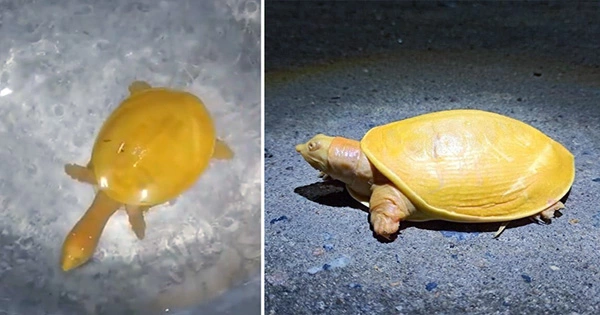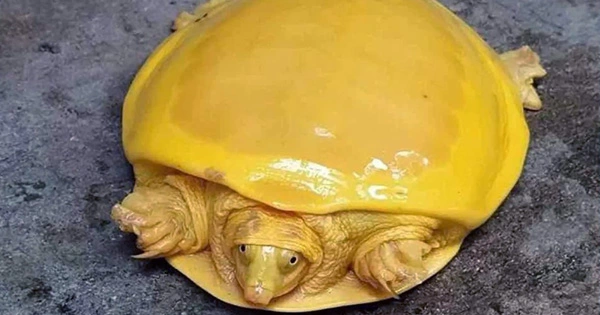An exceptionally uncommon Indian flap shell turtle with albinism has been spotted waddling around a lake in southern India, complete with a wonderfully light shell and gorgeous pink eyes. This attractive hatchling was observed by wildlife photographers Manoj Kumar Vittapu and Shravan Kumar Poshetty in August 2021 beside a freshwater pond in a wooded section of Sirinepally in Nizamabad District, Telangana, as reported in the journal Reptiles & Amphibians.
Despite its small size of 4 centimeters by 3 centimeters, the juvenile drew the pair’s attention due to its complete absence of colour. Buddi Laxmi Narayana, a curator at Nehru Zoological Park in Hyderabad, verified that the turtle was a rare albino Indian flap shell turtle after seeing their images. Below is a video of the microscopic turtle, which is accompanied by some playful piano music (sound on).

Albinism is a rare genetic abnormality that results in the absence of pigment in the skin, hair, or eyes; it is not to be confused with leucism, which results in light pigmentation. Individuals with the genetic disorder have a recessive gene mutation that effectively “turns off” the synthesis of melanin, the pigment responsible for the color of your skin, eyes, and hair. Vision issues can also be caused by a lack of melanin. In Pakistan, India, Sri Lanka, Nepal, Bangladesh, and Myanmar, the Indian flapshell turtle (Lissemys punctata) can be found in rivers and lakes. While there have been a few albino flapshell turtle sightings in the past, this is the first of its type in this area of India.
Unfortunately, the turtle’s unusual look will most certainly jeopardize its chances of surviving in the wild. It may not only succumb to health difficulties, but its lack of concealment will make it easy to notice for predators. But, hey, just a handful Indian flapshells can boast of being the subject of their own scientific paper.
Researchers have discovered the first documented example of an albino wild chimpanzee in Uganda’s impenetrable jungles. Unfortunately, the gang swiftly turned on the white-furred newborn and his mother, murdering him in a horrific attack. A team from the University of Zürich in Switzerland and the Budongo Conservation Field Station recently published their findings in the American Journal of Primatology.














